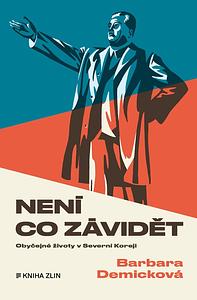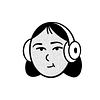You need to sign in or sign up before continuing.
Take a photo of a barcode or cover
This book was outstanding. I loved the authors ability to tell very personal stories, while zooming out to provide historical context at the appropriate time. This book was filled with awful details of life in North Korea, but also beautiful moments that really show how resilient people can be. I was genuinely moved by the love story between two of the major subjects of the book and how they found beautiful moments in a horrible place. Would recommend to anyone
Ever since I read The Orphan Master's Son, I wanted to read some non-fiction about North Korea. I've watched some documentaries about the country which piqued my interest, and with all the saber-rattling lately and the Olympics across the border it seemed like a good time to brush up on the Hermit Kingdom.
Nothing to Envy was written by Barbara Demick who was the North and South Korea correspondent for the Los Angeles Times. She visited North Korea but found that reporting about the country was almost impossible as all foreigners were assigned "minders" who kept the visitors in approved locations and didn't allow them to communicate with ordinary citizens. Most of her time in the Koreas was spent in South Korea, and there she met and interviewed six former North Koreans who successfully escaped to South Korea. These were "normal" citizens from typical North Korean families, all of whom grew up in smaller towns or the industrial city, Chongjin. Additionally, she interviewed a number of other North Korean exiles and experts on the country. The book contains extensive notes for each chapter and a long list of acknowledgements for the many people who contributed to the book.
Nothing to Envy was very interesting and sometimes hard to read. While only images the world sees are selected polished images of Pyongyang, this book gives you a glimpse in to the lives of regular folks just trying to survive. Most of whom would not "qualify" to live in Pyongyang due to their appearance, height, or intelligence. Poverty and hunger pervade outside the capital city. Humanitarian aid sent by the US and other nations were intercepted by the military and ruling elite. Millions and millions are spent on weapons and military hardware while citizens starve. This is a modern day tragedy with no end to the suffering in sight.
Nothing to Envy was written by Barbara Demick who was the North and South Korea correspondent for the Los Angeles Times. She visited North Korea but found that reporting about the country was almost impossible as all foreigners were assigned "minders" who kept the visitors in approved locations and didn't allow them to communicate with ordinary citizens. Most of her time in the Koreas was spent in South Korea, and there she met and interviewed six former North Koreans who successfully escaped to South Korea. These were "normal" citizens from typical North Korean families, all of whom grew up in smaller towns or the industrial city, Chongjin. Additionally, she interviewed a number of other North Korean exiles and experts on the country. The book contains extensive notes for each chapter and a long list of acknowledgements for the many people who contributed to the book.
Nothing to Envy was very interesting and sometimes hard to read. While only images the world sees are selected polished images of Pyongyang, this book gives you a glimpse in to the lives of regular folks just trying to survive. Most of whom would not "qualify" to live in Pyongyang due to their appearance, height, or intelligence. Poverty and hunger pervade outside the capital city. Humanitarian aid sent by the US and other nations were intercepted by the military and ruling elite. Millions and millions are spent on weapons and military hardware while citizens starve. This is a modern day tragedy with no end to the suffering in sight.
challenging
dark
informative
reflective
sad
medium-paced
This is such a heavy yet important and interesting read. As someone with only a vague idea about North Korea and its systems, I found it devastating and horrifying to learn about the tragedies its people have endured. What North Koreans consider luxuries are basic necessities for us, highlighting the vast economic gap between North Korea and its neighboring countries.
I'm grateful the author took the time to conduct in-depth research on this sensitive subject, interviewing actual defectors to maintain authenticity while shedding light on how ordinary Koreans live during the time of economic collapse.
Frogs in the well
An oral history of six North Koreans and their path to defection and freedom in South Korea.
In a country with sparse electricity, a culture of “night” develops. Walking through the center of a major city, one can’t see buildings on either side of a street. Young people meet, date, connect in the privacy afforded by darkness.
True believers in the Kim regime are forced to believe the unbelievable to survive. Suspicions abound. Your cousin might be an informant. You cannot be safe speaking honestly to your girlfriend. You must not keep a diary, lest your inner thoughts be used against you. You might have to leave a son or daughter behind to save your own life. During the famines of the 1990s, desiccated bodies in wheelbarrows are a common sight, and you might be inured to it.
And of course: each personage has a very different route of escape from North Korea.
Most affecting is the moment of realization, different for each person herein, that theirs is a broken, hungry, abusive society and that an alternative exists.
Devastating, humanizing, eye-opening. I loved this book.
An oral history of six North Koreans and their path to defection and freedom in South Korea.
In a country with sparse electricity, a culture of “night” develops. Walking through the center of a major city, one can’t see buildings on either side of a street. Young people meet, date, connect in the privacy afforded by darkness.
True believers in the Kim regime are forced to believe the unbelievable to survive. Suspicions abound. Your cousin might be an informant. You cannot be safe speaking honestly to your girlfriend. You must not keep a diary, lest your inner thoughts be used against you. You might have to leave a son or daughter behind to save your own life. During the famines of the 1990s, desiccated bodies in wheelbarrows are a common sight, and you might be inured to it.
And of course: each personage has a very different route of escape from North Korea.
Most affecting is the moment of realization, different for each person herein, that theirs is a broken, hungry, abusive society and that an alternative exists.
Devastating, humanizing, eye-opening. I loved this book.
As the title suggests, this book is about the lives of six people living in totalitarian North Korea. Though this book is nonfiction, it reads like a fictional book, with "characters" who just happen to really exist, plot and rising tension, and climactic decisions that change their lives forever. Author Barbara Demick deftly weaves together the stories of these six, together with information about life in North Korea, including a brief history of Korea, the Kim family's rise to power, healthcare in North Korea, a typical workday, a typical home, and the famine that I believe is still ongoing. Though this book was deeply disturbing from a human rights perspective, I think it is an important book to read to understand what is happening in our world. A really great read with lots of interesting information.
dark
informative
sad
medium-paced
dark
emotional
informative
reflective
sad
medium-paced
Powerful, relevant journalism. Reads like a novel. Can't recommend highly enough.
challenging
dark
emotional
informative
reflective
sad
fast-paced
adventurous
challenging
dark
emotional
informative
inspiring
slow-paced





